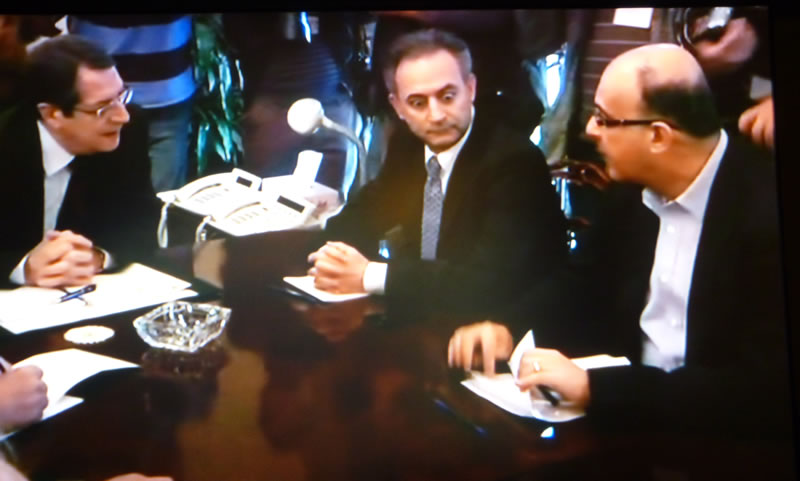Cyprus - Little Island, Big Problem
Stock-Markets / Credit Crisis 2013 Mar 23, 2013 - 01:18 PM GMTBy: Steve_H_Hanke
 Who’s going to bail out Cyprus: Brussels or Moscow? That’s the multibillion-dollar question. In mid-March, the European Union and the International Monetary Fund proposed a rescue package for the tiny island—to the tune of roughly $20.5 billion. But this bailout proposal was different: $13 billion in aid being offered was conditional upon Cyprus raising the remaining $7.5 billion through a hefty one-time tax on its bank depositors. Not surprisingly, the Cypriots, among others, were not pleased with this idea. And on March 19, to Brussels’s surprise, the Cypriot Parliament overwhelmingly rejected the bailout package. Officials are now scrambling to arrive at a solution before March 26, when Cypriot banks are scheduled to reopen.
Who’s going to bail out Cyprus: Brussels or Moscow? That’s the multibillion-dollar question. In mid-March, the European Union and the International Monetary Fund proposed a rescue package for the tiny island—to the tune of roughly $20.5 billion. But this bailout proposal was different: $13 billion in aid being offered was conditional upon Cyprus raising the remaining $7.5 billion through a hefty one-time tax on its bank depositors. Not surprisingly, the Cypriots, among others, were not pleased with this idea. And on March 19, to Brussels’s surprise, the Cypriot Parliament overwhelmingly rejected the bailout package. Officials are now scrambling to arrive at a solution before March 26, when Cypriot banks are scheduled to reopen.

Cypus eye popping financial crisis.
To some, the Cyprus crisis may seem like much ado about nothing—surely a tiny country of under a million people couldn’t possibly destabilize an institution as large and established as the European Union, right?
Wrong. For starters, Cyprus’s banking system is actually quite large—more than eight times larger than the Cypriot economy itself. What’s more, if Cyprus does end up partially financing a bailout using depositors’ money, it would set a dangerous precedent and could shatter confidence in an already-fragile European banking system. And if Cyprus’s banks do go bust, it would send shock waves through the markets.
Still, questions linger: why is this crisis happening now? And why did the EU prescribe such a bitter pill for the Cypriot depositors? If we look at who those depositors actually are, a clearer picture begins to emerge. The first thing to note is that European depositors’ money began to flow out of Cyprus’s banks back in 2010, and by now, most European depositors have already left. For European leaders, it was much easier to impose a tax on depositors once their constituents had pulled their money out of the country.
European leaders also waited until someone else showed up to pick up part of the tab for the bailout. It turns out that Russian depositors have been pouring money into Cypriot banks, taking advantage of Cyprus’s lenient money-laundering laws, among other things. Indeed, Russian deposits have more than doubled since the summer of 2010, reaching over $30 billion at the end of last year. But perhaps as much as another $30 billion of the so-called Cypriot deposits are also actually Russian. How can this be? Well, many Russian companies are actually set up as Cypriot parent companies, which in turn own a Russian subsidiary. The bottom line, then, is that Russian deposits (totaling approximately $60 billion) make up more than half of all the deposit money in Cyprus’s banks, as of December 2012.
This is where geopolitics enters the picture. What if Russian President Vladimir Putin decides to come to the rescue? Russia certainly could afford it, and as it turns out, there are a number of things that Cyprus could offer that would be quite attractive to Moscow, including natural gas—and possibly even a Mediterranean naval base.
Given how much Russia has to lose at the hands of the bailout package, it is little wonder that Putin is up in arms about the terms of the EU-IMF bailout. And given how much Cyprus has to lose in the event of a bankruptcy, it is little wonder that the Cypriot finance minister has flown to Moscow to try to cut a deal.
By Steve H. Hanke
www.cato.org/people/hanke.html
Steve H. Hanke is a Professor of Applied Economics and Co-Director of the Institute for Applied Economics, Global Health, and the Study of Business Enterprise at The Johns Hopkins University in Baltimore. Prof. Hanke is also a Senior Fellow at the Cato Institute in Washington, D.C.; a Distinguished Professor at the Universitas Pelita Harapan in Jakarta, Indonesia; a Senior Advisor at the Renmin University of China’s International Monetary Research Institute in Beijing; a Special Counselor to the Center for Financial Stability in New York; a member of the National Bank of Kuwait’s International Advisory Board (chaired by Sir John Major); a member of the Financial Advisory Council of the United Arab Emirates; and a contributing editor at Globe Asia Magazine.
Copyright © 2013 Steve H. Hanke - All Rights Reserved
Disclaimer: The above is a matter of opinion provided for general information purposes only and is not intended as investment advice. Information and analysis above are derived from sources and utilising methods believed to be reliable, but we cannot accept responsibility for any losses you may incur as a result of this analysis. Individuals should consult with their personal financial advisors.
Steve H. Hanke Archive |
© 2005-2022 http://www.MarketOracle.co.uk - The Market Oracle is a FREE Daily Financial Markets Analysis & Forecasting online publication.



